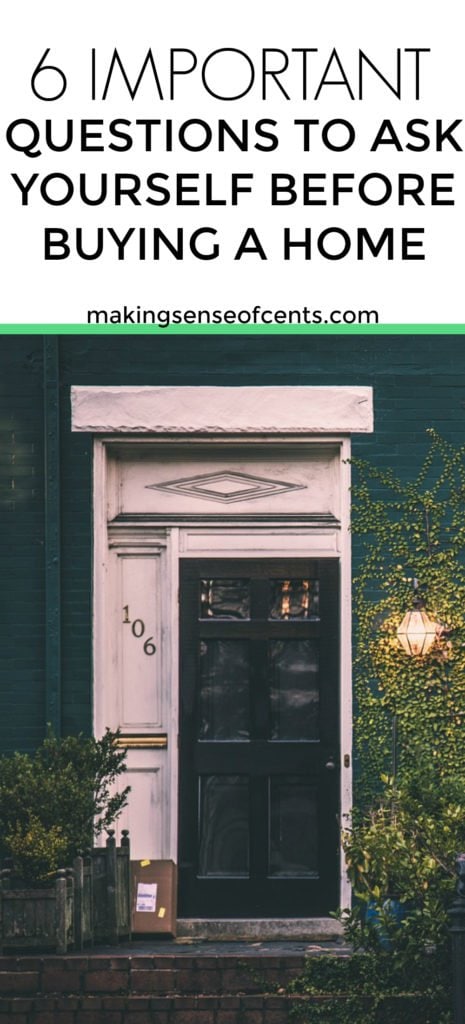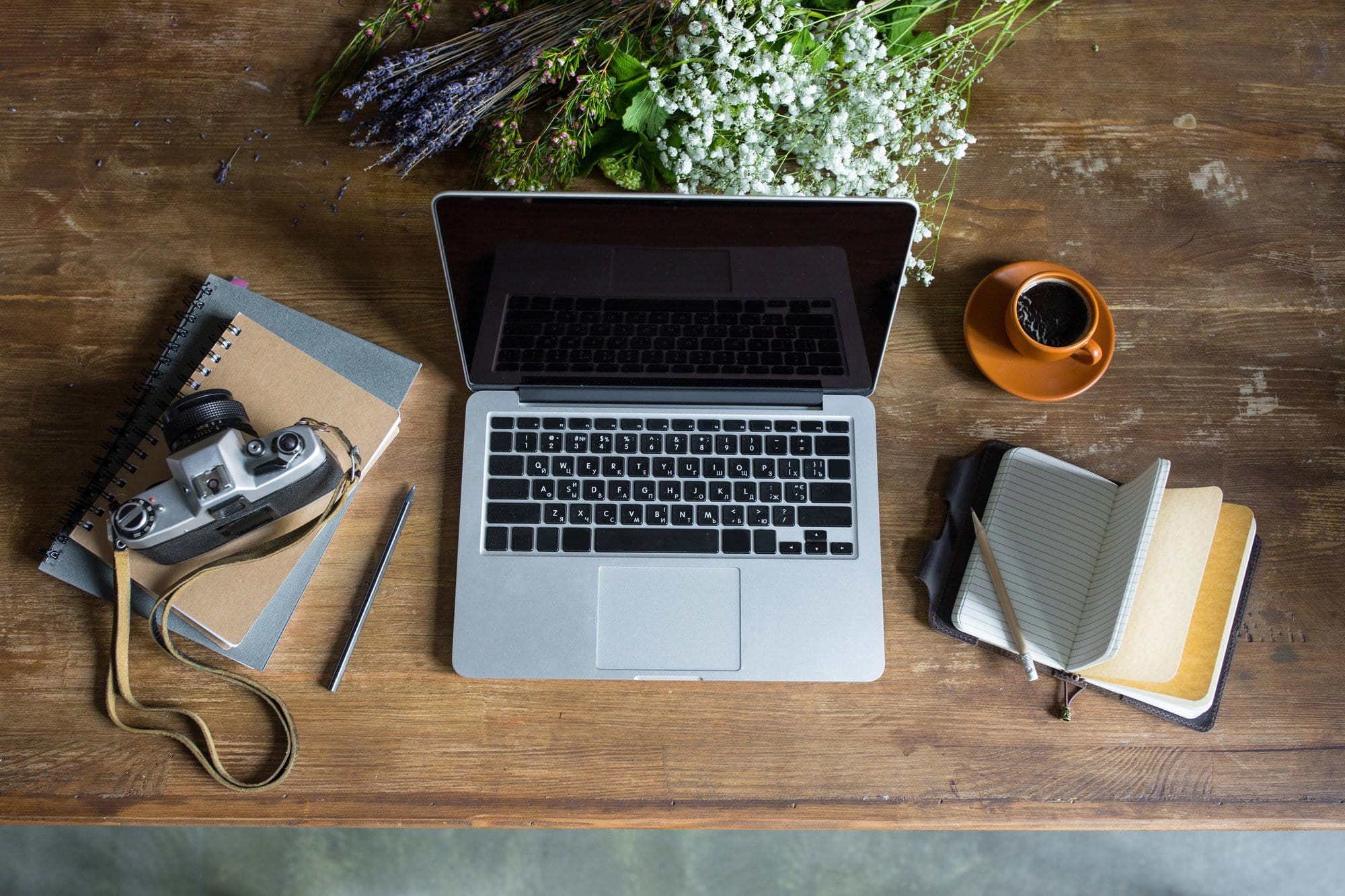The spring and summer months are usually the most popular months for buying a house. And, buying a house is probably the largest purchase a person will ever make.

Nearly everyone says that a house is a good investment. Many people will even go as far to say that doing anything other than owning a house would be a complete waste of money.
However, I don’t agree with that at all.
Buying a house isn’t for everyone. You shouldn’t jump at the opportunity to buy a house, especially any ol’ house. And, you should think about all of the factors before deciding that buying a house is the best and only decision for you.
Deciding to buy a house is a huge commitment, and problems may arise if you don’t fully think about how this big purchase will affect your life.
There are many questions to ask yourself before you buy a house, and not everyone will have the same answers. This is why it’s important to analyze your situation first.
Whether you are a first time home buyer or if this is your second or third house (or more!), you should still ask yourself these questions.
Related articles on a first time home buyer guide:
Everyone has felt that dreadful feeling that comes after making a large purchase and realizing that you have made a mistake. Perhaps you don’t realize for months or years later, but you eventually understand what a waste of money the purchase was.
And, no one wants to feel this way after buying a house!
Related:
- 30+ Ways To Save Money Each Month
- 75 Ways To Make Extra Money
- 15 Reasons You’re Broke And Can’t Save Money
What to ask yourself before buying a house.
Can you afford it?
Before you ask yourself any other questions about buying a house, you should most definitely make sure that affordability is a top priority.
If you can’t afford it, then you should not be buying that house.
It’s really that simple.
You will want to look at your overall financial situation and analyze:
- How much you make.
- Your job stability.
- How much you have saved.
- Your credit history.
- The total monthly amount you feel comfortable paying for a home. Make sure you look at all the costs involved!
- Your total amount of debt.
When buying a house, it takes analyzing all of these factors to realize what you can truly afford.
Many people try to justify a buying a house that is over their budget, but that is a horrible idea. Banks will usually pre-approve you for a mortgage payment that is higher than what you can actually afford. So, it’s a bad idea to go over that number or even beyond one that you are comfortable with.
AND, you should not just take what the bank pre-approves you for as the amount that you can actually afford. Like I said, banks tend to pre-approve for more, so that number is not a good gauge of what you can afford.
When determining what you can afford, you will want to think about ALL of the costs that come with buying a house and living in it. This means that your research should not end with the purchase price of the house – it actually goes way past that, as discussed in a later section.
Why do you want THIS house?
Buying house can lead to a crazy amount of new feelings – happiness, stress, excitement, and more. This can sometimes make every house you look at seem like the perfect one, and that’s because they all seem so new and exciting.
Before you put an offer on a house, you should think about the reasons for why you want a specific house. This is one of the first steps to finding a house that’s right for you, as this can make sure you are getting exactly what you want and need, rather than just being happy with any home.
I recommend creating a wish list that includes all of the things you want in a home. Your wish list could include things like::
- Whether you want to be in the country or the city.
- If you want a fenced in yard.
- How many bedrooms and bathrooms you need.
- The age of the home.
- The quality of the schools.
- The size of the kitchen.
- Your budget, and this one is extremely important!
And, you’ll also want to create a list of things that you want to stay away from, such as if you don’t want a place with a pool, a home with a lot of yard maintenance, a home that is a fixer upper, and so on.
By having this wish list on hand, you’ll know exactly what you should be looking at, and what you should avoid.
What other costs do you need to factor in?
When you find a house that you think is right for you, you need to make sure that you can afford ALL of the costs that come with that house.
Just because you can pay the monthly house payment doesn’t mean that you can afford everything else that goes with it. There are ongoing costs when buying a house, which is something that many homebuyers forget about.
In fact, U.S. homeowners, on average, spend more than $9,000 per year in hidden homeownership costs and maintenance expenses cost homeowners an average of $6,042 per year in unavoidable hidden costs. These include things like homeowners insurance, property taxes, and utilities.
Before making a home purchase, you should think about how much this house will cost you in the long run. There are many ways to think of this, such as:
- Property taxes- These vary widely from town to town. You may find yourself looking at two similar houses with similar price tags, but the property taxes may vary by thousands of dollars annually. That is a LOT of money. While it may seem small when compared to the actual home purchase price, remember that you have to pay property taxes annually, and a difference of just $3,600 a year is $300 a month for life.
- Gas– Many homes use gas to run the hot water heater, the stove, and so on.
- Electricity– Generally, the bigger your home, the higher your electricity bill.
- Sewer– This isn’t super expensive, but it is generally around $30 a month.
- Trash– This isn’t super expensive either, but it does cost money.
- Water (and possibly irrigation)- Depending on how you use water and where you live, water bills can vary widely. I know many who live in areas where the average water bill is a few hundred dollars each month.
- Home insurance- Home insurance can be cheap in some areas but crazy expensive in others. Don’t forget to look into the cost of earthquake, flood, and hurricane insurance, and know that it can add up quickly depending on where you live.
- Maintenance and repairs- No matter how old your home is (even brand new homes), repair and maintenance costs will eventually come into play. In fact, U.S. homeowners pay an average of $3,435 per year in annual optional costs, including house cleaning, yard care, gutter cleaning, carpet cleaning, and pressure washing. But, don’t forget about things like needing a new roof or other repairs that may come up!
- Homeowners association fees- This can also vary widely. You should always see if the house you are interested in is part of an HOA. Often, the fees are high and involve rules you may not like.
- Home furnishings- Furnishing your home can be done cheaply, but I know some who buy huge homes and can’t afford to put anything in them, such as a table, a bed, and so on. Why own a $500,000 house if you don’t have any furniture?
Always remember to add up the total cost when deciding to buy a house!
How long do you plan to live in the area?
It usually takes around 5 years to recoup the costs you paid to purchase a house. If you only live in a house for one or two years, then you may lose money on closing costs, because of the volatility of the real estate market, and more. Plus, it usually takes some time and legwork to buy a house, so you may not want to do it again so soon.
Due to this, you’ll want to think about how long you’ll be living in the area.
You’ll want to make sure that the house will be suitable for you for at least 5 years, so you’ll want to think about things such as:
- Are you happy with the area?
- How are the schools?
- Is the house big enough if you plan on starting a family?
- Do you plan on working in the area for at least 5 years?
And so on.
You really need to think about your future when deciding to buy a house.
Can buying a house wait 24 hours?
I know it’s tempting to jump on a house when you find it, but if the purchase can wait 24 hours, then you may want to delay it. This will allow you more time to think about the purchase, go over your budget again, let any butterflies you have about the home purchase go away, and so on.
You will be able to make a much more rational decision if you think about it for at least 24 hours.
Plus, for all you know, you may even realize that you don’t want the house at all!
Yes, I realize that some houses will sell rather quickly, but when you think you have a limited time frame, it can sometimes cause you to make a rush decision that isn’t good for you.
If you can, take 24 hours to make sure this house is right for you.
Do you really need/want this house?
Finally, the last question you should ask yourself is whether or not you actually need the house. It sounds easy enough, but many people do not even think about asking this question. When in fact, it is one of the most important questions to ask when buying a house (or any large purchase for that matter).
Really dig deep and ask yourself this simple question. Sure, you might think you want the house, but have you also been able to answer all of these other questions positively?
Buying a house is huge investment, and it deserves a lot of time and thought to make the best decision.
What other questions should a person ask themselves when buying a house?

Leave a Reply